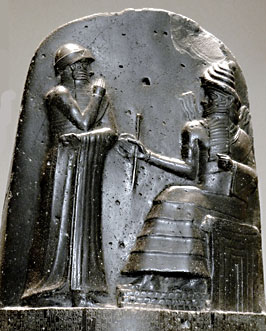 I’m reading The Fine Print, by David Cay Johnston, right now, and early in the book he shares this anecdote about the treatment of debt in the Code of Hammurabi:
I’m reading The Fine Print, by David Cay Johnston, right now, and early in the book he shares this anecdote about the treatment of debt in the Code of Hammurabi:
If you could not repay a debt because of circumstances beyond your control, such as a hailstorm flattening a field of grain, you could be excused from your debt—this amounted to an early form of bankruptcy protection. The clay tablet that recorded your debt could be washed, giving you a “clean slate,” a term we use to this day to describe unpaid debts that are forgiven.
This got me wondering: what’s the oldest source for an idiom still in common use? This one comes from about 1800 BC, so it’s certainly in the running. Any other candidates?

















